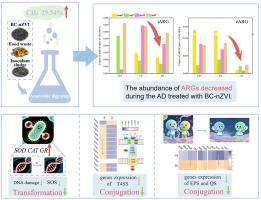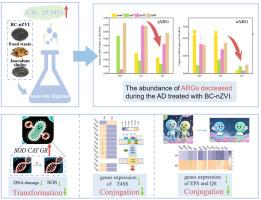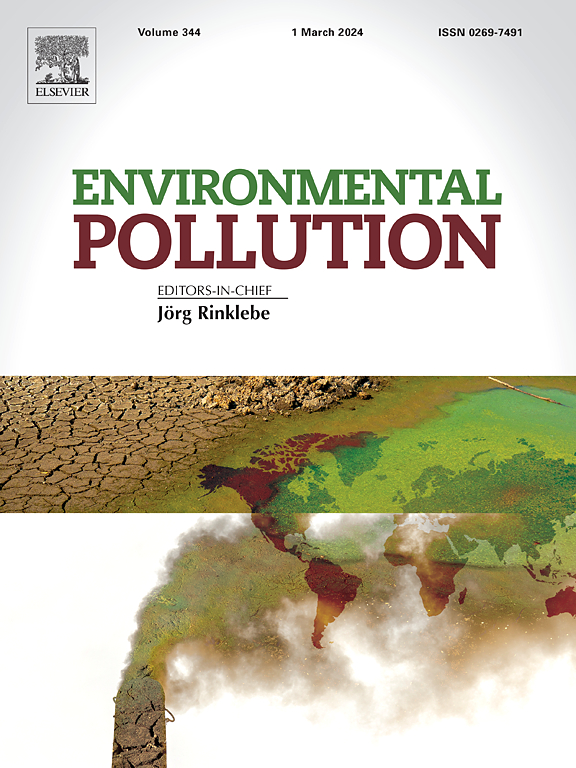利用生物炭负载的纳米零价铁增强缓解食物垃圾厌氧消化中的抗生素抗性基因
IF 7.3
2区 环境科学与生态学
Q1 ENVIRONMENTAL SCIENCES
引用次数: 0
摘要
食物垃圾是重要的生物质资源和抗生素耐药基因(ARGs)的储存库。生物炭负载的纳米零价铁(BC-nZVI)可以提高FW厌氧消化(AD)过程中的甲烷产量。然而,BC-nZVI对AD期间arg命运影响的潜在机制尚不清楚。本研究通过分析细胞内和细胞外ARGs (iARGs和eARGs)等代表性ARGs类型的动态变化,探讨BC-nZVI对总ARGs命运的影响。我们发现,在BC-nZVI治疗AD期间,大多数ARGs的丰度显著降低。其中,iARGs (tet32、ermF、sul1和tetW)相对丰度分别下降了30.58%、11.38%、16.69%和3.65%,而eARGs (tet32、ermF、sul1和tetW)相对丰度分别下降了95.09%、48.18%、88.55%和71.41%。细胞内和细胞外intI1的相对丰度分别下降了17.42%和41.96%。BC-nZVI增强微生物代谢,阻止SOS反应激活,降低IV型分泌系统的表达,减少细胞外聚合物质的分泌,这可能是导致ARGs降低的原因。这些结果表明,BC-nZVI可以通过减少ARGs的丰度和抑制其水平转移来有效减轻AD患者ARGs的风险。本文章由计算机程序翻译,如有差异,请以英文原文为准。


Enhanced mitigation of antibiotic resistance genes in anaerobic digestion of food waste using biochar-supported nanoscale zero-valent iron
Food waste (FW) is a crucial biomass resource and reservoir of antibiotic resistance genes (ARGs). Biochar-supported nanoscale zero-valent iron (BC-nZVI) can enhance methane production in the anaerobic digestion (AD) of FW. However, the mechanisms underlying the effects of BC-nZVI on the fate of ARGs during AD are remain unclear. Here, the impacts of BC-nZVI on the fate of total ARGs were investigated, by analyzing dynamics of representative types of ARGs including intracellular and extracellular ARGs (iARGs and eARGs). We found a significant decrease in the abundance of the most ARGs during AD treated with BC-nZVI. Specially, the relative abundance of iARGs (tet32, ermF, sul1, and tetW) decreased by 30.58 %, 11.38 %, 16.69 %, and 3.65 %, respectively, while that of eARGs (tet32, ermF, sul1, and tetW) decreased by 95.09 %, 48.18 %, 88.55 %, and 71.41 %, respectively. The relative abundances of intracellular and extracellular intI1 decreased by 17.42 % and 41.96 %, respectively. BC-nZVI enhanced microbial metabolism, prevented SOS response activation, reduced the expression of type IV secretion systems, and decreased extracellular polymeric substance secretion, which could contribute to the decrease in ARGs. These findings indicate that BC-nZVI can effectively mitigate the risk of ARGs in AD by reducing their abundance and inhibiting their horizontal transfer.
求助全文
通过发布文献求助,成功后即可免费获取论文全文。
去求助
来源期刊

Environmental Pollution
环境科学-环境科学
CiteScore
16.00
自引率
6.70%
发文量
2082
审稿时长
2.9 months
期刊介绍:
Environmental Pollution is an international peer-reviewed journal that publishes high-quality research papers and review articles covering all aspects of environmental pollution and its impacts on ecosystems and human health.
Subject areas include, but are not limited to:
• Sources and occurrences of pollutants that are clearly defined and measured in environmental compartments, food and food-related items, and human bodies;
• Interlinks between contaminant exposure and biological, ecological, and human health effects, including those of climate change;
• Contaminants of emerging concerns (including but not limited to antibiotic resistant microorganisms or genes, microplastics/nanoplastics, electronic wastes, light, and noise) and/or their biological, ecological, or human health effects;
• Laboratory and field studies on the remediation/mitigation of environmental pollution via new techniques and with clear links to biological, ecological, or human health effects;
• Modeling of pollution processes, patterns, or trends that is of clear environmental and/or human health interest;
• New techniques that measure and examine environmental occurrences, transport, behavior, and effects of pollutants within the environment or the laboratory, provided that they can be clearly used to address problems within regional or global environmental compartments.
 求助内容:
求助内容: 应助结果提醒方式:
应助结果提醒方式:


